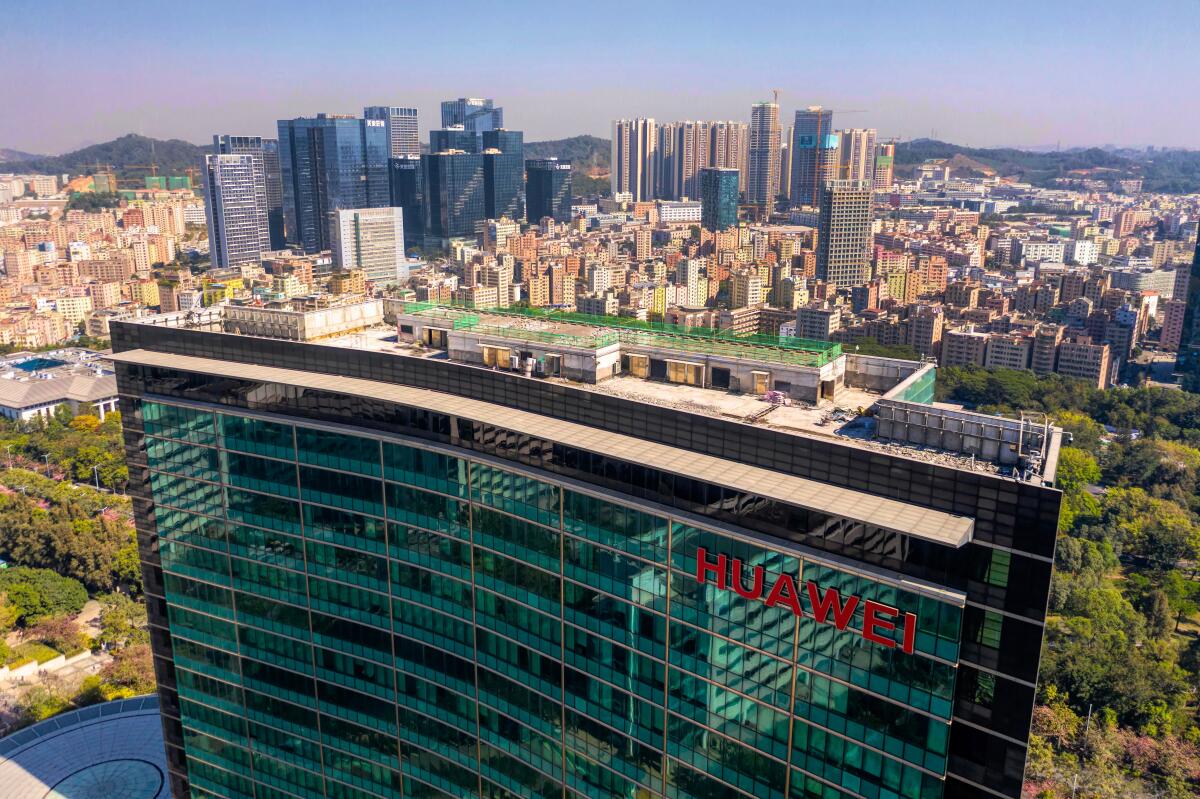U.S. hits Chinese tech giant Huawei with a racketeering charge

- Share via
The United States raised the stakes in its battle with Huawei Technologies Co., using a law historically associated with prosecuting mafia figures to claim the Chinese company engaged in decades of intellectual property theft.
Huawei, the world’s largest maker of telecommunications equipment, and Chief Financial Officer Meng Wanzhou had already faced criminal charges. The fresh allegations, announced Thursday, up the ante by including racketeering conspiracy, increasing the potential punishment. They come amid the global battle for supremacy in fifth-generation wireless technology, or 5G.
Huawei broke the law “to drastically cut its research and development costs and associated delays, giving the company a significant and unfair competitive advantage,” the Justice Department said in a statement. The company launched a bonus program to reward employees who got their hands on confidential information from competitors, prosecutors said.
The new charges depict a company that won international standing by stealing trade secrets, evading U.S sanctions and lying to authorities. They are likely to increase tensions between Beijing and Washington, which has accused Huawei of spying for the Chinese government, even as the U.S. Commerce Department gave Huawei a brief reprieve Thursday from a ban that will forbid some U.S. mobile providers from buying parts from the company.
The indictment doesn’t name the businesses from which Huawei allegedly stole intellectual property, but details of the allegations match descriptions of companies including Cisco Systems Inc., Motorola Inc. and Cnex Labs Inc.
“The indictment paints a damning portrait of an illegitimate organization that lacks any regard for the law,” Sens. Richard M. Burr (R-N.C.), the chairman of the Intelligence Committee, and Mark R. Warner (D-Va.), the panel’s vice chairman, said in an emailed statement. “Intellectual property theft, corporate sabotage and market manipulation are part of Huawei’s core ethos and reflected in every aspect of how it conducts business.”
Huawei doesn’t “abide by Western business practices,” Rob Spalding, a technology and security expert at the Hudson Institute who served on the National Security Council, said in an email. “Which is why many U.S. companies are no longer competitive in the global marketplace.”
Huawei, in turn, has accused the United States of orchestrating a campaign to intimidate its employees and launching cyberattacks to infiltrate its internal network.
“This new indictment is part of the Justice Department’s attempt to irrevocably damage Huawei’s reputation and its business for reasons related to competition rather than law enforcement,” spokesman Chase Skinner said. “The ‘racketeering enterprise’ that the government charged today is nothing more than a contrived repackaging of a handful of civil allegations that are almost 20 years old and that have never been the basis of any significant monetary judgment against Huawei.”
China’s Ministry of Foreign Affairs has urged the U.S. to “stop unreasonably targeting Huawei and other Chinese enterprises.”
Huawei was previously accused of violating U.S. sanctions against Iran and North Korea. Meng, the CFO, was charged with fraud last year, with the case rippling into Canada, where she is fighting extradition to the U.S. Meng’s lawyers have argued in court that their client did nothing wrong.
The United States said Huawei stole trade secrets — including copyrighted works, source code and user manuals for internet routers — to “grow and operate” its business. The company swiped antenna technology and robot testing technology, prosecutors said.
Then, they said, it doubled down.
“When confronted with evidence of wrongdoing, the defendants allegedly made repeated misstatements to U.S. officials, including FBI agents and representatives from the U.S. House Permanent Select Committee on Intelligence, regarding their efforts to misappropriate trade secrets,” they said.
The U.S. dates the thefts to 2002.
In the new indictment, the government is wielding some prior allegations of wrongdoing, such as Huawei’s alleged theft of a phone-testing robot developed by T-Mobile US Inc., to build a more muscular case. The U.S. alleged that a Huawei engineer secretly took photos of T-Mobile’s robot, Tappy, took measurements of parts and stole a piece of it. Huawei blamed “rogue actors” within the company when T-Mobile threatened to sue, the U.S. said.
Intellectual property theft “explains a lot of Huawei’s success,” said Jim Lewis of the Technology Policy Program at the Center for Strategic and International Studies in Washington. “Huawei is the poster child for China’s commercial spying.”
Also this week, a top White House official, U.S. national security advisor Robert O’Brien, said Huawei is capable of accessing “sensitive and personal information” via a back door in the networking equipment it sells around the world.
Huawei said in a statement that it follows the same standards as other telecom operators, which require “lawful interception” facilities to comply with court-ordered wiretaps, but forcefully denied it illicitly accesses data. “Huawei has never and will never covertly access telecom networks, nor do we have the capability to do so,” the company said.
Hurtado, Sebenius and Shields write for Bloomberg.






